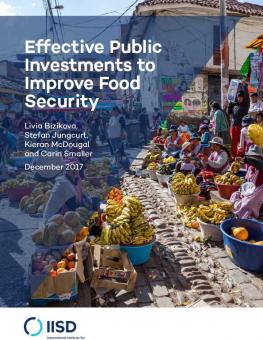
Effective Public Investments to Improve Food Security
The world has made significant progress in reducing hunger over the past decade. But hunger remains a major challenge. This policy brief identifies the most effective and efficient ways to invest in improving food security.
The world has made significant progress in reducing hunger over the past decade. But hunger remains a major challenge. This policy brief identifies the most effective and efficient ways to invest in improving food security.
It is derived from a longer peer-reviewed article entitled: Can interventions in the agricultural sector improve food security? A Systematic Review of Available Evidence.
A key message is that context matters. Where interventions had no or negative impacts on food security, the reason for failure was often the lack of consideration of broader community challenges, gender inequality and wealth inequity – whereas the successful interventions stressed the importance of prior analysis or a baseline assessment. Improved food security is often the result of multiple, well-designed interventions. The focus is less about finding the right intervention, and more about ensuring that interventions are designed and implemented with the particular context in mind. An important research gap exists regarding evidence on the efficiency of interventions relative to their costs.
You might also be interested in
Ending Hunger: What would it cost?
The International Institute for Sustainable Development and the International Food Policy Research Institute joined forces to estimate what it would cost to end hunger, and the contribution that donors need to make.
Early-stage screening for responsible investment in agriculture and food systems
The United Nations Food and Agriculture Organization (FAO) and IISD's due diligence tool helps agribusinesses align investments with the Committee on World Food Security's Principles for Responsible Investment in Agriculture and Food Systems (CFS-RAI), guiding early decisions to ensure sustainable and responsible investment.
Sustainable Asset Valuation of the Nutrition Sensitive Agriculture Capacity Strengthening Project in Ethiopia
This report analyzes the social, economic, and environmental outcomes of implementing agroforestry and climate-smart agriculture in Ethiopia.
Good COP? Bad COP?: Food systems at COP29
The 29th United Nations Climate Conference (COP 29) in Baku failed to build on the notable progress made on food systems at COP 28. However, it wasn't all doom and gloom.